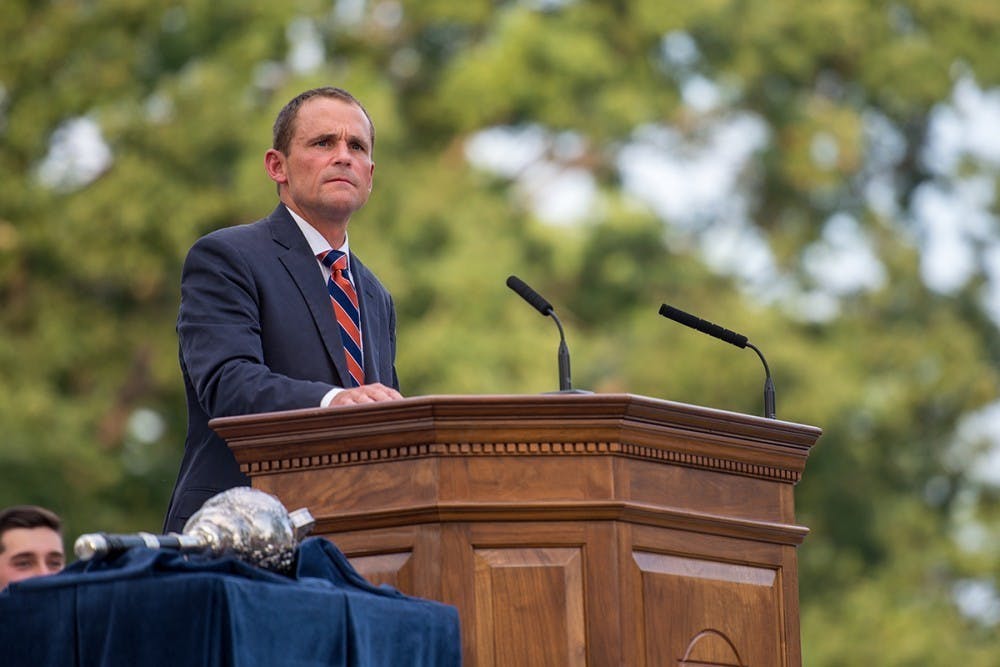Within “A Great and Good University: The 2030 Plan,” the document that outlines the goals drafted by University President Jim Ryan and the Board of Supervisors for the next 10 years, there’s a distinct feeling that everything is looking up. Ryan’s plan is intended to “strengthen our foundation...cultivate the most vibrant community in higher education... enable discoveries that enrich and improve lives...and make U.Va. synonymous with service.” These outlined goals give the impression that the University is not only aiming to improve the lives of students, faculty and staff, but the entire Charlottesville community and beyond. The plan, however, is riddled with contradictions, showing itself to be a corporate facade that will inevitably fail to deliver on its outlined goals.
The proposed plank of being a “community that consistently lives its values” rings hollow. Ryan claims that enacting this plan will allow the University to "both study and be accountable as an institution to address pressing societal challenges, including...social mobility.” In reading statements such as these, it appears that the defining ethos of the plan is for the University to just "do good things." It’s vagueness like this that lets the plan appear progressive and hopeful, while obfuscating it’s intent to cater to corporations.
At the core of this is whether universities should be about education, or simply accreditation for jobs. Addressing social mobility is laudable, but missing is the discussion of how the University exists primarily as a school meant to sustain class division. As the New York Times showed, 67 percent of U.Va. students come from the top income quintiles, and later in life, 62 percent end up in the top quintile. Corporations, parents and students can easily read goals like helping students “pursue meaningful and productive careers” to mean that the University is primarily focused with training workers meant to produce profit — a far cry from education as an enlightening project. This just solidifies the University as engaging in a transaction with its students, where we pay tens of thousands of dollars for credentials that are meant to make money.
Perhaps the most mask-off statement is under the banner of “[leading] economic development through academic discovery and entrepreneurship.” The goal is to make it “easier for faculty and students to commercialize their academic discoveries and intellectual property.” A not-so-challenging translation just shows this is about making money. To anyone that sees education as a public good, it is an embarrassing display of neoliberalism to positively claim the benefits of helping people commercialize knowledge and discovery made at a public university. This isn’t the same as training for jobs, rather it is about locking away knowledge and ideas behind money when they should be for the public to use and learn from.
The plan dives into some key initiatives, some of which are good, like expanding the financial aid program AccessUVa, and seeking to providing on-Grounds housing for first- and second-year students. Others showcase the limited ability of the University to resolve the contradictions of its impact on the community. For example, on the same page, the plan touts the “Good Neighbor Program” while also showing off the incoming School of Data Science. The Good Neighbor Program plans to address issues like housing and wages, of which U.Va. has made good on the latter to a degree, and exacerbates the former to an unsustainable extent.
For all the good that raising direct employees wages to 15 dollars an hour achieves, it means less when the University has taken few meaningful steps to reduce housing prices in the City where there is a need for 3,300 new housing units. Also, as I’ve written previously, the School of Data Science is a tool of local billionaire Jaffray Woodriff to completely destroy the working-class community of Charlottesville. There’s no attempt to resolve these contradictory “key initiatives” where the facilitation of a corporate pipeline under the School of Data Science contributes to the destruction of the University’s neighbors.
Notably missing from Ryan’s plan is any substantive initiative aimed at addressing the housing crisis in Charlottesville. The University owns so much land in Charlottesville, and is such a large economic center, that the decisions made internally for the future of the University also impact the broader Charlottesville-Albemarle community. Any plan that proposes expansion of the University also has an obligation to outline how it will mitigate impacts on the community around us. The Emmet-Ivy corridore, a 14.5 acre plot of land has had a variety of options laid out over the last few years. In the 2016 strategic study, it was suggested that the corridor could be used to expand staff, student or even Charlottesville residential housing, thereby helping alleviate some of the massive shortfall in housing stock. Instead, the Board of Visitors opted to prioritize the creation of a new hotel and convention center. In the choice between even moderate reform versus placating corporate interest, it was no contest, and corporate interests won out.
At its core though, the plan masks corporate interest behind words like “inclusion,” “diversity,” “innovation” and “excellence.” Make no mistake, the choice between bowing to corporate interests and contributing positively to a community is often incompatible. Ryan’s plan isn’t so much about offering a positive vision for the future, but rather branding the neoliberal trajectory of the University as somehow good for working-class people in our immediate community and beyond.
Jake Wartel is an Opinion Columnist for The Cavalier Daily. He can be reached at opinion@cavalierdaily.com.





